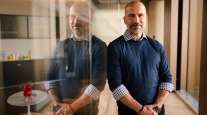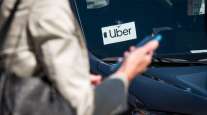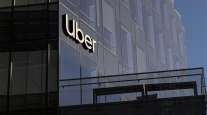Uber Resumes Testing Self-Driving Cars in San Francisco

[Stay on top of transportation news: Get TTNews in your inbox.]
Uber has resumed testing of robot cars in San Francisco, two years after one caused a fatal accident in Arizona.
Two Volvo XC90 self-driving Uber cars will cruise city streets during daylight hours, each staffed by two front-seat safety drivers.
“Our testing area will be limited in scope to start, but we look forward to scaling up our efforts in the months ahead and learning from the difficult but informative road conditions that the Bay Area has to offer,” Uber said.
Host Seth Clevenger went to CES 2020 to look at the road ahead for electric-powered commercial vehicles. He spoke with Scott Newhouse of Peterbilt and Chris Nordh of Ryder System. Hear a snippet, above, and get the full program by going to RoadSigns.TTNews.com.
The ride-booking company ceased all autonomous-car testing in March 2018 after one of its test vehicles hit and killed a pedestrian in Tempe, Ariz. That car had one backup driver; investigations showed that she was watching a video at the time of the collision. Most companies testing autonomous cars have two backup drivers per car. Uber’s car lacked emergency braking, instead relying on the human operator to take over if needed.
Uber was widely criticized for cutting corners in a rush to market. Co-founder and former CEO Travis Kalanick had famously said that robot cars were critical to its future profitability.
Uber said it has made numerous safety improvements since then.
Human backup drivers have completed new training including “dedicated time on defensive- and distracted-driving courses, as well as improved test track situational awareness drills,” the company said.
The California DMV revoked Uber’s permission to test robot cars in San Francisco after the collision but granted it a new permit in February. Uber said also it had informed the San Francisco Municipal Transportation Agency of its plans.
Uber’s fatal accident affected the entire industry of companies racing to develop self-driving cars, which many think will be the future of the automobile industry.
Just a couple of years ago, experts and companies alike predicted that robot cars would be ubiquitous by 2020. Those optimistic forecasts were reset as public confidence in the emerging technology plummeted.
Uber sought to hedge its bet on self-driving last year, when it agreed to take $1 billion from SoftBank, Toyota and Japanese auto components maker Denso for stakes in its Advanced Technology Group, the division developing autonomous technology.
Uber already has resumed robot-car testing in several other cities, operating up to 20 vehicles in Pittsburgh, where it has a major R&D center; up to two each in Dallas and Toronto; and up to four in Washington.
Want more news? Listen to today's daily briefing:
Distributed by Tribune Content Agency, LLC





